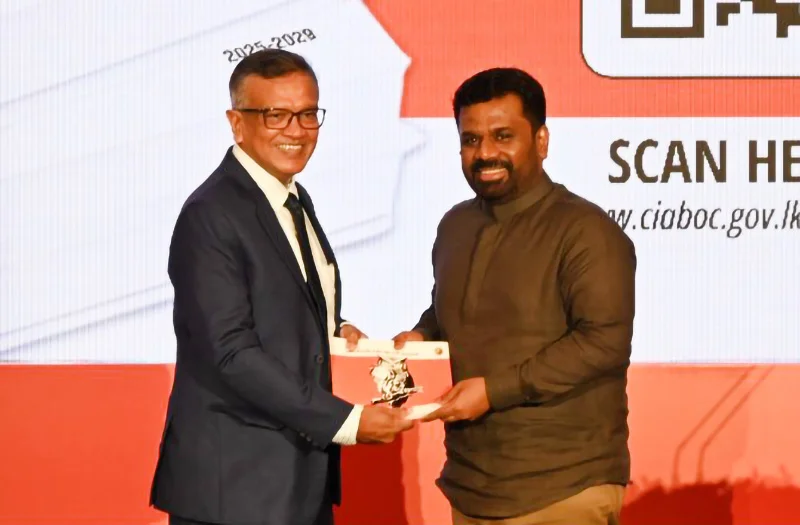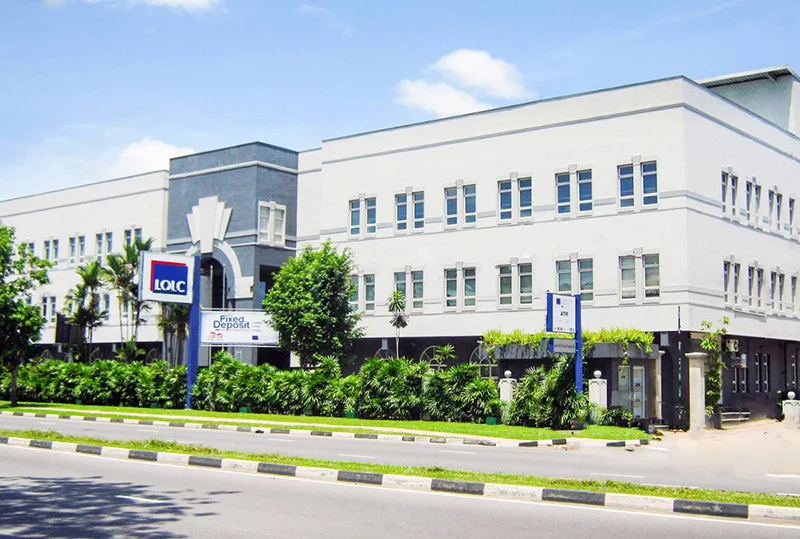Business
Shyam takes helm at Sunshine Holdings as nephew succeeds uncle Vish in leadership transition

Under a Colombo sunset at the Taj Samudra, laughter, applause, and celebratory toasts recently marked the farewell of Vish Govindasamy, who stepped down from his executive role at Sunshine Holdings PLC after 28 years of transformative leadership.
The event, attended by business leaders, Sunshine’s senior team, and industry stakeholders, honoured his legacy as he transitioned to the Non-Executive Deputy Chairman role, while his nephew, Shyam Sathasivam, assumed the Group CEO position—a testament to the family bond steering this corporate evolution.
Sunshine Holdings announced that Govindasamy would continue in advisory capacity to ensure strategic continuity.
Govindasamy’s tenure which began in 1997 as CEO of Watawala Plantations, saw the Group expand into healthcare, consumer goods, renewable energy and dairy, while launching iconic brands such as Zesta, Watawala Tea, and Ran Kahata as well as Healthguard Pharmacy. Under his stewardship, Sunshine forged partnerships with global giants such as Wilmar and SBI Japan, earned recognition among Asia’s Best Workplaces, and championed social impact through the Sunshine Foundation for Good.
Shyam Sathasivam, Govindasamy’s nephew and successor, joined Sunshine in 2005 and has been integral to its recent growth. Having collaborated closely with his uncle for nearly two decades, Shyam emphasised his commitment to upholding the Group’s purpose-driven ethos: “Mr. Govindasamy nurtured a vision that blends business with heart. I am honored to build on this legacy, ensuring we continue to care for all stakeholders,” he stated at the farewell event.
During his address, Govindasamy observed attendees dispersed across the room and humorously underscored his attention to detail by remarking, “I kindly request everyone to assemble closer to the stage—such nuances catch my eye, a testament to my micro-management tendencies.” The lighthearted comment drew laughter while reflecting his reputed dedication to organizational precision.
Then shifting to the matter at hand and reflecting on his journey, Govindasamy acknowledged the Group’s resilience through Sri Lanka’s civil war and economic crises, expressing confidence in his nephew’s leadership: “Sunshine’s future is bright under Shyam. Our shared values and his forward-thinking approach will drive new heights,” he said.
The transition underscores a unique fusion of family trust and corporate strategy, positioning Sunshine Holdings for its next chapter.
By Sanath Nanayakkare
Business
National Anti-Corruption Action Plan launched with focus on economic recovery

In a decisive move to stabilize Sri Lanka’s economy and rebuild investor confidence, the Commission to Investigate Allegations of Bribery and Corruption (CIABOC) yesterday launched the National Anti-Corruption Action Plan (NACAP) 2025–2029, with a clear focus on promoting transparency, accountability and economic governance.
Developed with the support of the United Nations Development Programme (UNDP) and funded by the government of Japan—contributing nearly USD 900,000—the initiative aims to address corruption as a critical economic barrier.
The launch, attended by President Anura Kumara Dissanayake, Chief Justice Murudu Fernando PC, and high-level diplomatic and institutional representatives, signals a shift in Sri Lanka’s economic reform narrative. The NACAP is seen not just as a governance tool but as an economic recovery strategy designed to attract foreign investment, improve public finance management and rebuild public trust.
R.S.A. Dissanayake, Director General of CIABOC, noted that corruption, “is more than a legal issue—it is an economic cancer that stifles innovation, distorts markets and deters foreign direct investment.” The establishment of Internal Affairs Units (IAUs) within government institutions is expected to bring internal oversight to public spending and performance, improving the efficiency of state services.
Japanese ambassador Akio Isomata stressed that eliminating corruption is essential for Sri Lanka to regain global investor confidence. “Transparency and good governance are fundamental pillars for sustainable economic development, he said. “For Sri Lanka to attract foreign investment and achieve long-term growth, the effective implementation of this Action Plan is crucial.”
Echoing this, UNDP Resident Representative Azusa Kubota highlighted the importance of aligning governance with economic goals. “The NACAP is a roadmap for transforming Sri Lanka’s economic governance, she said. “It will make corruption visible, measurable, and actionable.”
The NACAP is built on four strategic pillars—Preventive Measures, Institutional Strengthening & Enforcement, Education, and Law & Policy Reform—targeting nine priority areas. These include streamlining state enterprise management, modernizing financial crimes investigation and integrating anti-corruption education into economic policymaking.
The implementation timeline is designed with a phased approach: short-term stabilization, medium-term reform and long-term transformation—ensuring consistent progress toward a more accountable and economically resilient state.
“Corruption ends here. The responsibility of eradicating bribery and corruption will not be passed on to the next generation — it will be resolved by our government today, President Anura Kumara Dissanayake said.
The President stressed it marks a turning point in Sri Lanka’s history. “With the launch of the National Anti-Corruption Action Plan 2025–2029, we are drawing a bold line in the sand. No longer will the fight against corruption be tangled in politics or postponed for the future. Public officials now have six months to bring transparency and integrity to their institutions. After May, the law will act decisively and without exception. This is not just policy — it’s a promise. A new era of accountability has begun and it begins with us.”
By Ifham Nizam
Business
Verdant Capital doubles down: $13.5m now powering LOLC Africa’s MSME expansion

Verdant Capital invests $4.5M more in LOLC Africa, expanding MSME lending across 10 countries and deepening financial inclusion efforts continent-wide.
Verdant Capital has announced that its Verdant Capital Hybrid Fund (the “Fund”) has completed an additional investment of USD 4.5 million in LOLC Africa Singapore Limited (“LOLC Africa”). This investment brings the total investment in LOLC Africa to USD 13.5 million. This follows the initial investment of USD 9 million in LOLC Africa, completed in June 2023. Both investments are structured as holding company loans, and they are being directed towards LOLC Africa’s operating lending subsidiaries in Zambia, Rwanda, Egypt, Kenya, Tanzania, Nigeria, Malawi, Zimbabwe, Ghana, and the Democratic Republic of Congo.
Founded in 1980 in Sri Lanka, LOLC entered the African continent in 2018. Verdant Capital Hybrid Fund is the first external investor in LOLC Africa’s operations, reflecting the Fund’s catalytic investment approach. These investments are driving the expansion of LOLC Africa’s micro, small and medium enterprises (MSMEs) financing footprint across the continent. Additionally, the Fund’s Technical Assistance Facility (TAF), has offered financial support for LOLC Africa’s Social Ratings and Client Protection Pre-Certifications for its subsidiaries in Zambia and Egypt, with further Technical Assistance initiatives in the pipeline.
Business
HNBA’s advisor & partnership channels drive 26% growth

HNB Assurance PLC (HNBA) delivered another year of outstanding financial performance, securing a 7.5% market share and moving a step closer to achieving its ambitious target of 10% market share by 2026. This success was a result of the company’s well-structured strategies, focused on sustainable growth in an increasingly competitive landscape, which yielded impressive results, with its Gross Written Premium (GWP) growing by 26% compared to the previous year.
Over the past four years, HNBA has maintained an average growth rate of 26%, consistently outperforming the industry. A key element of HNBA’s approach has been prioritizing distinctive, value-driven products over high-volume, lower-margin offerings. This strategy has allowed the company to cater to a broader customer base, ensuring inclusivity while maintaining the competitiveness and relevance of its product portfolio
In terms of growth, HNBA’s proactive investment strategy resulted in an 8% growth in investment income, reaching Rs. 6.9 Bn, while Funds Under Management saw a 26% increase. HNBA paid net benefits and claims totaling Rs. 2.9 Bn. The total assets of the company expanded by 24% to Rs. 53.4 Bn, primarily driven by increased financial investments. Additionally, total Life Insurance contract liabilities grew by 25% to Rs. 38.6 Bn, following a surplus transfer of Rs. 1.3 Bn to shareholders.
-

 Business3 days ago
Business3 days agoColombo Coffee wins coveted management awards
-

 Business5 days ago
Business5 days agoDaraz Sri Lanka ushers in the New Year with 4.4 Avurudu Wasi Pro Max – Sri Lanka’s biggest online Avurudu sale
-

 Features4 days ago
Features4 days agoStarlink in the Global South
-

 Business6 days ago
Business6 days agoStrengthening SDG integration into provincial planning and development process
-

 Business5 days ago
Business5 days agoNew SL Sovereign Bonds win foreign investor confidence
-

 Features1 day ago
Features1 day agoSri Lanka’s Foreign Policy amid Geopolitical Transformations: 1990-2024 – Part III
-

 Features4 days ago
Features4 days agoModi’s Sri Lanka Sojourn
-

 Midweek Review1 day ago
Midweek Review1 day agoInequality is killing the Middle Class











